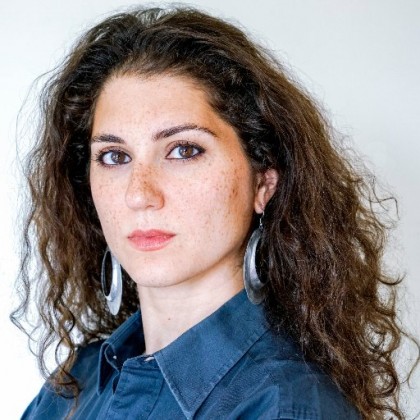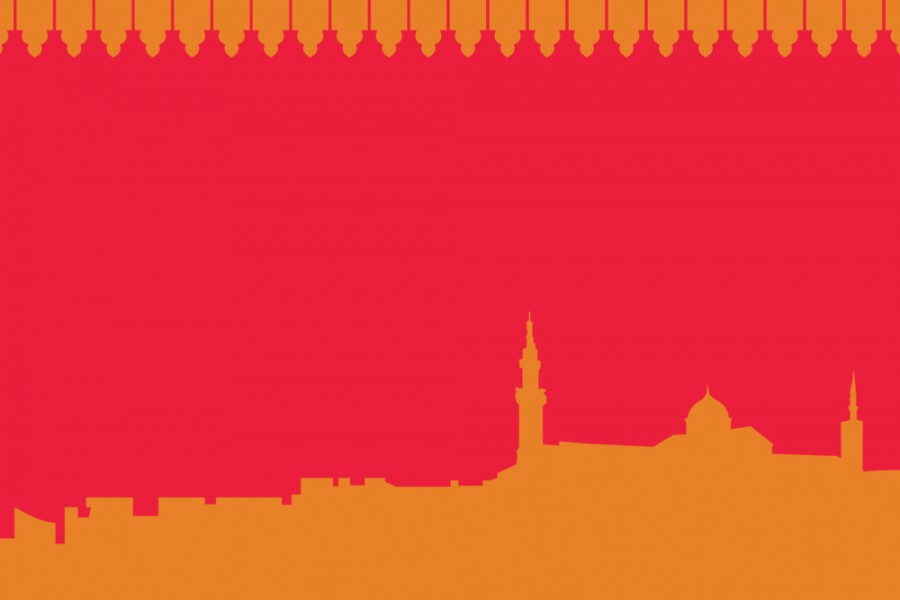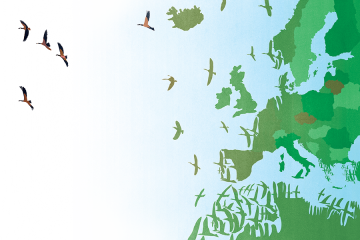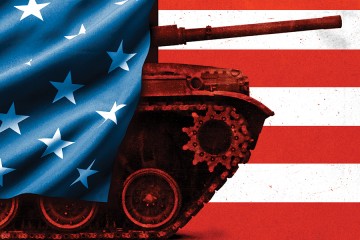Alia Malek, SAIS Eur '95 (Cert), A&S '96, daughter of Syrian immigrants, returned to Syria in 2011 to complete the restoration of her maternal grandmother's house in Damascus, a house now owned by her mother. She lived there until May 2013, and the experience produced a memoir and history of her family in Syria, The Home That Was Our Country (Nation Books, 2017). In these excerpts, the nation has begun to spiral into civil war in July 2011, and a government crackdown is making life difficult in the western city of Homs.

Since mid-March, regime security forces and troops had surrounded Homs, and several residents had been killed, many shot at Saturday funerals for protesters who had been killed during Friday demonstrations—the week now had a certain routine. In recent weeks, the regime had been tightening its grip, arresting scores of people in house-to-house raids. The sound of gunfire was now frequent enough that [my mother's friend from university] Athena said she and [her husband] Faris could tell what sort of weapon had been fired and how far away it was. They had learned when to stay inside, and when the risk outside was manageable.
Bashar al-Assad's wife—Asma—originally hailed from Homs. His marriage to a woman from a prominent Sunni family was meant to help assuage the tensions that kept arising over an Alawite family ruling over a Sunni-majority country.

Image caption: Alia Malek
Athena and Faris lived in a mixed neighborhood—Sunni and Christian. Their apartment was large, and their only son had moved out after getting married. We ate a modest lunch together and took siesta. I had reluctantly finally given in to this. Siesta in Syria is not a mere short nap. It's a two-hour pause in the day. There are many reasons to do it, particularly in the summer. It can be too hot to make being outside pleasant. And before air conditioning, it wasn't really pleasant to be moving. More convincingly, everything is closed and everyone else is sleeping. Syria and Syrians are very nocturnal, and since one will be staying up late anyway, a long siesta helps keep a body rested. I came to appreciate how it also reset the day and how in Syria, the days thus happen twice.
But with the risk of violence increasing, the central part of the city already, for the most part, no longer reopened for the evening. Athena, however, determined that I would still get a glimpse of what normal life in Homs was like, took me to the nearby Hotel Safir following our nap. Hotels in the Middle East are spaces for the locals as much as for out-of-towners. Syrians like to go to hotels. They have coffee, order food, or sit on the verandas or poolside and smoke a cigarette or argheeleh, the waterpipe.
The sun had yet to set, and those fasting would have not eaten or drunk anything since it had risen. We took a table on the deck of the pool, in which no one was swimming. It was already dusk, and other patrons who had ordered juice (or beer) were counting down the moments until the mosques would let us all know the sun had set.
We didn't linger much longer. The rules of engagement then were still relatively clear. Weapons would only come out after the fast had broken and night had taken over. It was a short visit to the hotel, but I imagined it was something Athena would treat visitors to back when people still visited Homs from outside. It felt like a performance of normality, even as it was slipping away, and giving way to a new one. In those early days, visible evidence of the growing conflict in these central parts of town was still hard to see, but it was there in the altered rhythms of the city.
Athena was apologetic that we wouldn't be able to stay out during the night, which was when Syria used to come alive, especially during the summer and during Ramadan. She outlined for me all that we would see the next day—she'd show me Homs as she knew it and loved it, all her favorite things. She promised to show me the souk, which was miniature compared to Damascus's but special nonetheless; the old Christian neighborhood, the Hamidiyeh, where my grandfather Ameen was from; the church of Um al-Zanaar (Mother of the Belt), which housed a relic believed to be the Virgin Mary's belt; and the Agha restaurant, located in a refurbished 150-year-old house. It would be a beautiful guided tour, ominously prescient that many of these places would only be preserved in memory.
But for the evening we'd stay in. We quickly made it back to Athena's house. The prayers would be ending soon, as well as the breaking of the fast, and the men would spill out of the mosque or their homes into the street. To socialize, to protest, or just to get from point A to B.
At home, Athena and Faris changed into their house clothes and slippers and we all met back in the living room. Usually they'd sit on the balcony and enjoy the breeze. But now they stuck to the relative safety of their living room.
"The symphony will start soon," Faris dead-panned, gesturing with his head to the balcony and the street behind him. We had left the sliding doors open to let the fresh air in.
Almost on cue a few gunshots sounded. Then a barrage of automatic gunfire. I was slightly startled, but Athena and Faris didn't flinch. He looked up at me from his newspaper and said, "Even if there are things that are wrong in this country—and there are—this is not the way to approach the regime."
Also see
I asked him what other recourse the people had. But then the house phone rang. "Ahlayn, ahlayn," Athena said, answering the phone—Welcome, welcome. "How are you? When did you get back?"
The gunfire got louder, and she raised her voice to be heard and to hear. "Hello?"
As her ears readjusted to the competing sounds, those from outside and the one inside her receiver, she said, "You were saying? Yes, go on."

Nine months later, Malek has a disquieting evening out with friends in Damascus.
The day before the anniversary of the first protests in Dara'a, March 11, 2012, I returned to the 'Asrouniyeh souk with [my cousin] Tala. There were a few more things I needed for Salma's kitchen. The souk was full of people, and I found myself again looking at people's faces and trying to read their minds. After all, we weren't really able to talk to each other—directly or indirectly. In freer societies, indirect exchanges can take place in spaces of national conversation, such as the political, media, and pop-culture arenas. Of course, those other societies are never as inclusive as they could be, but it was nothing like the invisible yet almost tangible barriers between people in Syria.
As we made our way through the different khans and alleyways, Tala spotted a friend, Akram, who lived in Homs. He had a bohemian spirit with long hair, an earring, and a wooden cross around his neck. She told me he was always singing and dancing and laughing.
"You two must meet," she said. She flagged him down and introduced us. ...
Tala knew Akram because she had visited the initiative he worked for in Homs, called Al Ard, The Land. A Dutch Jesuit priest had started it—Father Frans, who had been in Homs for nearly fifty years and spoke Arabic almost like a native. ... When I asked [Akram] how he had gotten involved, he told me he had run away from home at the age of thirteen. Akram came from a middle-class family that was respected in its circles, but he hated his father, who was abusive toward his mother. So one morning, Akram took a bus to Damascus. By day he had slept in the Umayyad Mosque, just a few steps away from where we were sitting. An old imam there kept an eye on him but couldn't let him stay past 10 p.m., when he had to lock the mosque's doors for the night. After adult men tried to prey on him, Akram went back to Homs, where he said Father Frans took him in at the monastery, saving him from the street. Akram then worked side by side with Father Frans and the other Jesuits, but without the expectation that he would join the order. He grew up under their care.
Akram explained how, before the revolution had started, he had hated the rigid society his parents belonged to. When he pierced his ear, he said, no one who knew his parents would even say hello to him. He also hated certain agents of the regime—especially the officer who insisted on bribes from him when he did his compulsory military service. When the officer had demanded a TV from him, the Jesuits had helped him secure one. But Akram said his eyes weren't fully opened to the regime until he saw the police open fire on protesters.
"It was then I understood that the regime was like my father. I hate my father, and I hate the regime," he said.
I looked at everyone around us to see if anyone was listening, and I tried to smile and not look like we were in a dissenting conversation. We had both noticed a man who had taken a seat above us on a mezzanine. He had been staring at us as we talked.
That same officer in the army who had demanded bribes had also threatened Akram after the demonstrations started. He came to Akram and told him he had been seen at demonstrations and that he better show up at the pro-regime manifestation coming up. "You have a lot of girls among your relatives," the officer had said, and Akram understood the threat.
Akram felt he had no choice but to go, but this got him in trouble with an anti-regime fighter who was new to Homs. In the summer of 2011, Assad had released the man from prison, along with many radicalized prisoners who the regime knew were likely to take up arms against the government. This fighter had put the word out that he wanted Akram's head because Akram had been spotted at the pro-regime manifestation, sending Akram into hiding in the small villages outside of Homs. What saved him was that both the regime officer and the ex-prisoner died within a month of each other in 2011. When Akram came out of hiding, the FSA [Free Syrian Army] told him he was safe. They all knew about his work at Al Ard.
His friend Bassem soon joined us; we barely had enough space for another chair around our table, but Tala had to leave, so he took her seat. Like Akram, Bassem was Christian and also against the regime. He was flustered about something that had happened recently to two of his friends, both young women—one Christian, the other Muslim. They had been active in distributing medicines to both Hama and Homs, something I'd soon learn was a transgression in the regime's eyes. For their "crimes," and in the light of day, they were taken from a Damascus café. Someone they thought was a friend had informed on them.
I was silent. Criminals or radicalized prisoners being released by the regime, young women being arrested for providing medicines to civilians—it was all so cynical, calculated, and dirty.
"Shoo?" What? they asked me, detecting my distress.
Of the many things bothering me, I told them how what worried me was that communities were being seen monolithically—people were being judged not as individuals but collectively. I told them how even people I was sure were fundamentally good had made some problematic statements, such as, "All Alawites would have to pay for what the regime had done," or that "all Sunnis wanted a religious state." I told them how a Kurdish friend had criticized Christians for not being vocal, once asking me, "Why haven't they come out in Bab Touma?" referring to the Christian quarter of Old Damascus.
Akram scoffed right away, saying, "Why haven't they come out in Mezzeh?" referring to a well-to-do neighborhood where many of the rich Sunni families lived. With a smile and conviction, he added, "It will all be over soon. The regime can't survive this." But he did fear that the regime would do as much as possible in the short term to weaken its opponents' position.
I looked up at the man who was watching us. He slowly looked away as he took a drag of his cigarette. Akram was watching him, too. It was now well after 10 p.m. Even if the Middle East is more nocturnal than other places, in light of events, people were getting home earlier these days.
Akram turned out to be staying with the Jesuits, very close to Ain al-Kirish, and we set out together. As we walked, we talked about the man who had been watching us. Akram didn't think he could hear us, but that he was likely trying to read our demeanor.
From the café, we soon passed in front of the arch and columns that remained from when the Umayyad Mosque had been the site of the Roman temple to Jupiter. They towered above our heads. The arch stood at one end of the Hamidiyeh. On the other side was the long vaulted bazaar. I had never been there so late; every last shop was closed. As far as I could see, besides us, there wasn't another single soul around. To get to the other side, to Revolution Street, we'd have to traverse the entire length—a quarter mile—of the bazaar in pitch blackness.
"Should we go around?" I asked—there were still lights on behind us and around us.
"But this way is so much shorter," Akram said.
So we took one step into the darkness. The more steps we took, the darker it became. As my eyes adjusted, the outlines of the Hamidiyeh became more visible and familiar, like the ink drawings I had bought years ago of this same spot, the entire souk suggested by just a few scratches of black.
We also lowered our voices, lest their echo escape us and alert anyone we were there, but also because the bouncing of any sound waves testified to the vastness of the space and how imposing it was. Our low tones kept it human scale. I couldn't help thinking that it was impossible that no one else was there. Was the man from the café following us?
I quickened our pace to make it out to the other side, where the light and noise of the street awaited us, outside the walls of Old Damascus.
Posted in Arts+Culture, Voices+Opinion
Tagged syria, memoir, world in flux










